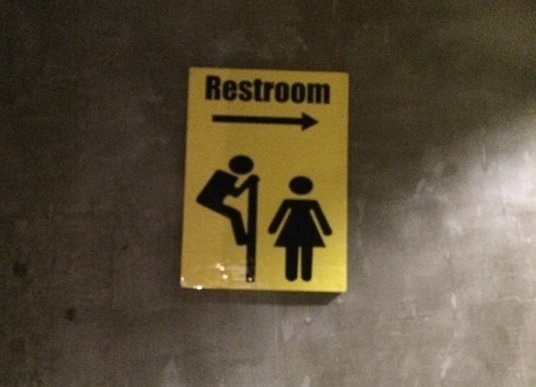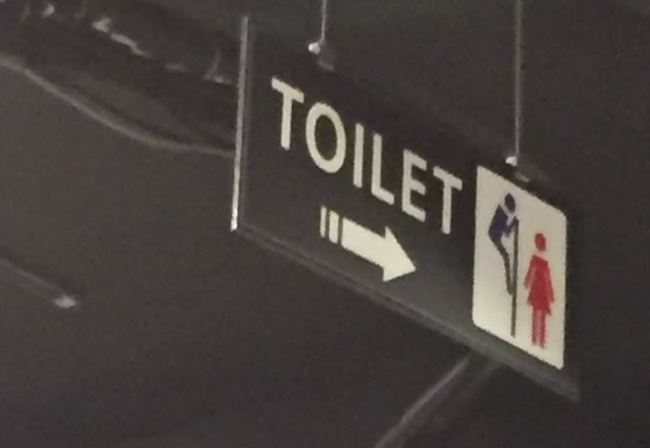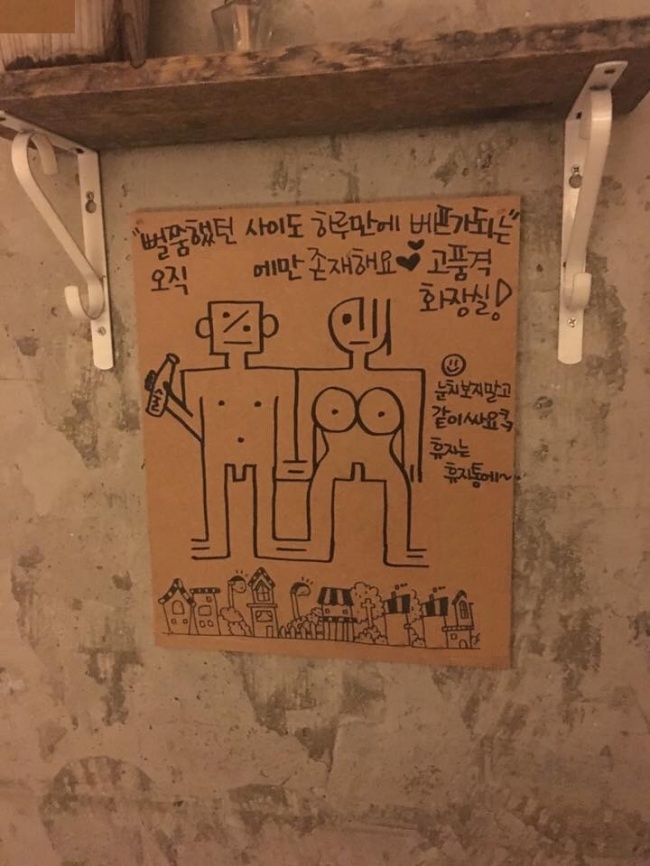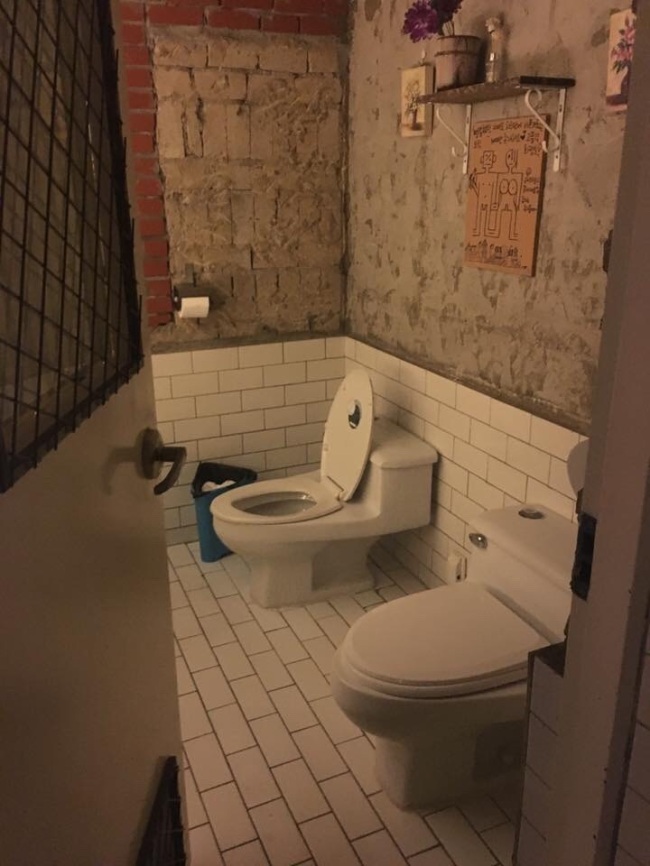Voyeuristic public toilet signs in Seoul stir controversy
By Claire LeePublished : July 13, 2016 - 16:36
Back in March, Lee Da-kyung found something disturbing while dining with her boyfriend at a restaurant near Seoul National University in Seoul. It was the property’s bathroom sign -- it showed a stick figure animation of a male peeping tom looking into a female restroom.
“I told the cashier -- who looked like the owner of the restaurant -- that the sign made me feel very uncomfortable and he should remove it,” the 23-year-old university student told The Korea Herald.
“And his response was even more shocking. He was rather nonchalant about it, and said, ‘Oh, it was designed by the interior design firm (that decorated our restaurant). It’s just supposed to be funny.’ But it was not funny at all.”
“I told the cashier -- who looked like the owner of the restaurant -- that the sign made me feel very uncomfortable and he should remove it,” the 23-year-old university student told The Korea Herald.
“And his response was even more shocking. He was rather nonchalant about it, and said, ‘Oh, it was designed by the interior design firm (that decorated our restaurant). It’s just supposed to be funny.’ But it was not funny at all.”

About three months after this incident, Lee was distressed again to spot a similar public bathroom sign in another restaurant -- this time near Gangnam Station.
“I was furious because the signs were being viewed as something comical, when what it’s portraying – voyeurism in public bathrooms -- is actually a crime,” said Lee.
The discomfort was more acute as it was located in a district where a mass anti-misogynist campaign was held in May, in tribute to a woman who was murdered by a stranger that month in a public bathroom. The suspect had said he hated woman.
While voyeurism has received relatively little attention as a sex crime in South Korea, there has recently been a rising number of cases that addressed the issue as a serious violation.
Earlier this week, a group of male students at Seoul National University were accused of sharing photographs of fellow female classmates they secretly took in a private mobile chat room. The students also allegedly shared sexually abusive, and often misogynistic comments against the photographed women. The Seoul National University Human Rights Center has launched an investigation into the case.

In April, the government announced that it will close down Sora.net, a highly popular adult community site where users shared secretly taken pictures of women’s body parts, many of which were captured in public bathrooms using hidden cameras. The decision was made 10 years after it was first established as concerns and protests surged.
The number of reports of sex crimes involving intrusive pictures of women increased dramatically here from 341 to 6,735 from 2005-2014.
Lee said she could see a connection between the voyeuristic signs and the recent case at Seoul National University.
“I read that one of the accused guys said that he didn’t have any ‘ill intentions’ against the women, and he and his friends were just having fun by making jokes,” she said.
“Neither the conversation the male students shared nor the voyeuristic bathroom signs are funny. It’s almost like the general public became so used to the blurred lines of what should be considered as criminal activities and what are harmless jokes.”
Min Soo-ji, a graduate student at Seoul National University, also had a disturbing experience while hanging out at a bar in Seoul’s Sinchon area.
The women’s bathroom in the bar had two toilets beside one another and there was a poster stuck on the wall showing a drawing of a naked man holding a bottle of alcohol and a naked woman. The poster read, “Don’t be shy and pee and (expletive) together.”

Disturbed and furious, Min asked her male companion to check the men’s bathroom to see if it also had the same poster. It turned out the poster was only put up in the women’s bathroom.
“The Public bathroom is a private space (where your privacy should be respected),” the 25-year-old told The Korea Herald. “I think putting up posters like this -- both sexually explicit and vulgar -- only in women’s bathroom can be seen as a product of sexism and misogyny. It almost felt like the poster had a connotation that women’s public bathrooms are where sexual activities take place.”
Kim Young-ran, a researcher at the Korean Women’s Development Institute, said the “joke” should be taken more seriously as they can be considered a criminal act.
“If such signs were put up in a private space, that’s one thing. But to allow such signs in the public space gives the wrong idea that it is okay to spy on women,” she said.
There is a need for a government-led initiative and regulation against such loose perception and tolerance toward voyeurism, she added.

The owner of the restaurant in Gangnam, who refused to be named, said the sign had been up for nearly seven years and no one has ever complained about it until The Korea Herald contacted him.
He said although he’s willing to remove the sign, he personally does not understand why it is problematic.
“So we are now living in a society where even this -- which was created to be funny -- can’t be tolerated as a joke?” he said.
Both the Women‘s Policy Bureau and Women’s Rights Promotion Bureau at the Gender Ministry declined to comment on the issue, saying the Ministry of the Interior is in charge of policies on public bathrooms.
“We might need a new legislation to tackle this issue,” said an official from the Ministry of Interior. “At the same time, regional governments, not the central government, are responsible for coming up with their own detailed policies and regulations on public restrooms.”
Lee Da-kyung said the incidents reminded her of her childhood when male classmates would often pick on her and even hit her on her private parts. When confronted by her parents, the boy’s parents said it was because the boy was showing her affection.
“I think they all share the same narrative and patterns -- framing the victims as ‘too sensitive’ and perpetuators as ‘those just trying to be funny.'"
By Claire Lee (dyc@heraldcorp.com)






![[From the Scene] Monks, Buddhists hail return of remains of Buddhas](http://res.heraldm.com/phpwas/restmb_idxmake.php?idx=644&simg=/content/image/2024/04/19/20240419050617_0.jpg&u=20240419175937)








![[From the Scene] Monks, Buddhists hail return of remains of Buddhas](http://res.heraldm.com/phpwas/restmb_idxmake.php?idx=652&simg=/content/image/2024/04/19/20240419050617_0.jpg&u=20240419175937)

![[KH Explains] Hyundai's full hybrid edge to pay off amid slow transition to pure EVs](http://res.heraldm.com/phpwas/restmb_idxmake.php?idx=652&simg=/content/image/2024/04/18/20240418050645_0.jpg&u=20240419100350)

![[Today’s K-pop] Illit drops debut single remix](http://res.heraldm.com/phpwas/restmb_idxmake.php?idx=642&simg=/content/image/2024/04/19/20240419050612_0.jpg&u=)